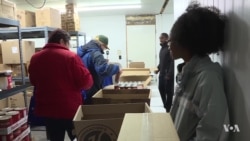Winter has come to Fargo, North Dakota, and at the Great Plains Food Bank on the north side of the city, 16-year-old Puja Chetri and 18-year-old Maria Tuya are stocking up for the season.
Chetri, a refugee who fled Nepal with her family when she was 10, and Tuya, a refugee from South Sudan, know the food packages they are stacking up could go a long way to feed their families.
“Sometime(s) we don’t have that much to eat; usually there’s like a box of cereal,” Chetri explains, something Tuya says she can also relate to.
“When I open the fridge, there is not much I can pick from.”
There is variety at the Great Plains Food Bank, where they sort, stack and pile their haul into the bed of a pickup truck. But their destination is not into the cupboards of their own homes.
They plan to simply…give this food away.
“When we hand them food and they go out the door, their facial expression is so bright,” Chetri told VOA, holding back tears while trying to explain the personal rewards she gets by organizing a food pantry to feed those in need around her.
“They are so delightful; there is so much gratefulness in their facial expression, they are getting little hopes each day when we are handing this food out.”
Chetri and Tuya’s pop-up food pantry is in part an answer to Fargo’s need, where almost 15 percent of the population live below the poverty level. While this exercise in giving was conceived and executed by refugee students including Chetri and Tuya, it is one of the many lessons sponsored in part by the non-profit Legacy Children’s Foundation, which Executive Director Mary Jean Dehne explains is “an after-school resource to help at-risk kids, low income students receive the resources they need to graduate from high school.”
North Dakota is one of the leading resettlement locations, per capita, for refugees coming to the United States.
About 400 refugees each year arrive in the state, where they are gradually reshaping the ethnic and cultural makeup of their adopted hometowns. More than 5,000 refugees from more than 40 countries now call the city of Fargo and the surrounding area home.
The transition for refugees in this northern state is not always easy, and, while the Legacy Children’s Foundation does not solely focus on refugees, Dehne says they are often the ones who come to the organization with the greatest risk of dropping out of school.
“They really are challenged with feeling like they are fitting in,” she told VOA from the modest office she works from in a converted home in one of Fargo’s poorest neighborhoods. “They look different, they talk different, they have a different dialect; they don’t always understand what the teacher wants when they ask questions.”
It is all too familiar, and painful, for Puja Chetri, who choked back tears explaining her hardship in adapting to life in her new country.
“When you see people in your grade level, and you’re not there, and you are so far behind, and you are taken out of class regularly, it just hurts.”
Thanks to Legacy’s programs, which include English lessons, math tutors, and speech therapy sessions, both Chetri and Tuya are among a growing group of success stories who are either currently excelling in, or have already graduated from high school.
“Honestly, if this program didn’t exist, I wouldn’t be here,” says Chetri. “I don’t know what I’d be doing.”
“Not only has it helped me with school and education, it has also helped me with leadership skills and confidence,” says Maria Tuya, who will graduate from high school later this year.
Confidence is an attribute at the core of their determination to pay back Legacy...by paying it forward, not just at the pantry, but also at area homeless shelters where they bring warm food, warm blankets, and, above all for Chetri, hope.
“When someone is helping you do better, you just want to give back and make someone else’s life get better,” she explains.
“A small act of kindness can go a long way.”
A long way in making North Dakota’s long, cold winter nights a little bit warmer for those struggling this holiday season, thanks to some of its newest, and most grateful neighbors.











